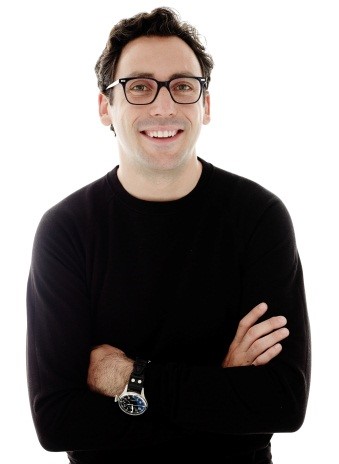Contributor: Liz Stiverson
Work and Life is a radio program hosted by Stew Friedman, director of the Wharton Work/Life Integration Project, on Sirius XM’s Channel 111, Business Radio Powered by The Wharton School. Every Tuesday from 7:00 PM EST, Stew speaks with everyday people and the world’s leading experts about creating harmony among work, home, community and the private self (mind, body and spirit).
On Work and Life, Stew Friedman spoke with Neil Blumenthal, co-founder and co-CEO of Warby Parker, an industry-disrupting lifestyle brand that offers designer eyewear at low prices and ties every purchase to the donation of a pair of glasses to someone in need. Blumenthal, a Wharton alumnus, discussed the genesis of Warby Parker and why a mission employees can believe in is critical to a company’s success.
The following are edited excerpts of their conversation.
Stew Friedman: What was the motivating idea for Warby Parker, and how did you bring it to life?
Neil Blumenthal:  The idea behind Warby Parker was that glasses are too expensive. Jeff, Andy, Dave and I had just started our MBAs and were sitting in a computer lab at Wharton, complaining about how expensive glasses are after Dave lost his $700 glasses in the seat pocket of an airplane right before school started. We thought, “Could we do something about this?” Andy had a great idea to sell glasses online; we had seen category after category move online, from Blue Nile selling engagement rings to Zappos selling shoes. And before business school, I had trained low-income women to start their own businesses selling glasses in the developing world with Vision Spring, so I knew a little about the industry. I knew we could design our own frames and manufacture them ourselves. Selling online gave us the ability to go direct to consumer, so we could sell glasses for $95, below wholesale prices, instead of $500, because we could bypass the middleman.
The idea behind Warby Parker was that glasses are too expensive. Jeff, Andy, Dave and I had just started our MBAs and were sitting in a computer lab at Wharton, complaining about how expensive glasses are after Dave lost his $700 glasses in the seat pocket of an airplane right before school started. We thought, “Could we do something about this?” Andy had a great idea to sell glasses online; we had seen category after category move online, from Blue Nile selling engagement rings to Zappos selling shoes. And before business school, I had trained low-income women to start their own businesses selling glasses in the developing world with Vision Spring, so I knew a little about the industry. I knew we could design our own frames and manufacture them ourselves. Selling online gave us the ability to go direct to consumer, so we could sell glasses for $95, below wholesale prices, instead of $500, because we could bypass the middleman.
SF: You also had the idea to tie each purchase to a donation, which became a very important aspect of your model.
NB: What ultimately excited us about this idea was the do-good factor – the fact that we were going to sell $500 glasses for $95 and therefore transfer billions of dollars from large, multinational corporations to normal people. This was going to be a job where we woke up in the morning and instead of turning over and hitting the snooze button, we would be excited to come to work. We built the company with that mindset, and it was with that mindset that we realized that there are seven million people on the planet who don’t have access to glasses. Even at a $95 price point, we could afford to give away a pair for every pair we sell.
Like many people, we were motivated to have a positive impact on the world, and the question was just what the best way to do that would be. We could volunteer for a couple hours a week on weekends, or we could spend 40, 60, maybe 80 hours a week – everything we do, all our time – having a positive impact. I believe the most effective use of my time is to use my specific tools and skills – general management, user experience, customer service, financial acumen – to have the biggest positive impact I can.
SF: Your idea is one that is certainly held by most people of your generation and the generation following you. You must get tons of people wanting to work for you. So why aren’t more companies taking your approach?
NB: I think they’re starting to. Certainly the vast majority of new start-ups have baked values- and mission-thinking into their DNA, and I think a lot of Fortune 1000 companies are waking up to the fact that they need to be doing the same. That’s not to say that Fortune 1000 companies weren’t founded to do great in the world – I think most businesses inherently do good in the world. But I think as a company gets bigger, scales, and goes public, it’s easy to start focusing more on optimization rather than on growth or solving problems. And when you’re optimizing and trying to maximize profit at all costs, thinking more for the short term than the long term, you can lose sight of having a positive impact.
SF: What do you and your colleagues at Warby Parker do to be sure you don’t lose sight of what’s important?
NB: We try to incorporate our stakeholders in every decision we make. When I say stakeholders, I’m referring to our customers, our employees, the environment, and the community at large. For example, from day one, we offered free shipping and free returns to our customers. We thought that’s what customers wanted, it’s what the four of us as consumers wanted, and we thought it was fair and appropriate, so we decided to we would find a way to make it work financially. For our employees, research has shown that people leave their jobs because they’ve stopped learning or they don’t like their boss. So we do quarterly 360-degree reviews, monthly informal feedback sessions, workshops, and outside speaker sessions, to build great managers and provide plenty of learning opportunities.
SF: How can the idea of incorporating stakeholders to shape corporate culture in ways that influence the world be replicated in other settings, especially those where the traditional model has held sway for so long?
NB: The first step for individuals could be doing their own jobs with a stakeholder mindset. In situations where you do have decision-making authority, how do you think about the impact of your decisions on the environment and the broader community? Another step is to become an advocate within your organization, and explain things in mission-driven terms. We believe that every company and organization is dependent on talent, and in order to win the talent war, we believe we have to be mission-driven. To be customer-first, you have to be employee-first, and to be employee-first, you have to be mission-first.
SF: Can you explain that connection?
NB: A recent World Economic Forum Study showed that 80% of Millennials put mission ahead of compensation when deciding where to apply for jobs, and it was a global phenomenon, not unique to the U.S. We’ve hired over 350 people in the last three and a half years; my co-founder and I have interviewed every one of them, and our social mission always comes up. When we ask, “Why do you want to work here?” they say, “I love the brand, I love the buy-a-pair, give-a-pair program, I love the idea of a disruptive company trying to do good in the world – I want to be part of that.” Our mission – to demonstrate to the world that you can build a scalable, profitable business that does good in the world without charging a premium for it – helps us recruit and retain the best people, and we think that’s only going to accelerate in the future.
Blumenthal is one of Fast Company’s 100 Most Creative People in Business, an Ernst & Young Entrepreneur of the Year, and one of the World Economic Forum’s Young Global Leaders. Hear more from him on Twitter @NeilBlumenthal.
Join Work and Life next Tuesday, June 24 at 7 pm on Sirius XM Channel 111 for conversations with Cary Cooper and Steven Klasko (WG’ 96). Visit Work and Life for a full schedule of future guests.
About the Author
Liz Stiverson received her MBA from The Wharton School in 2014.
received her MBA from The Wharton School in 2014.
Leave a Reply